小学英语语法总复习-句型
小学英语语法总复习
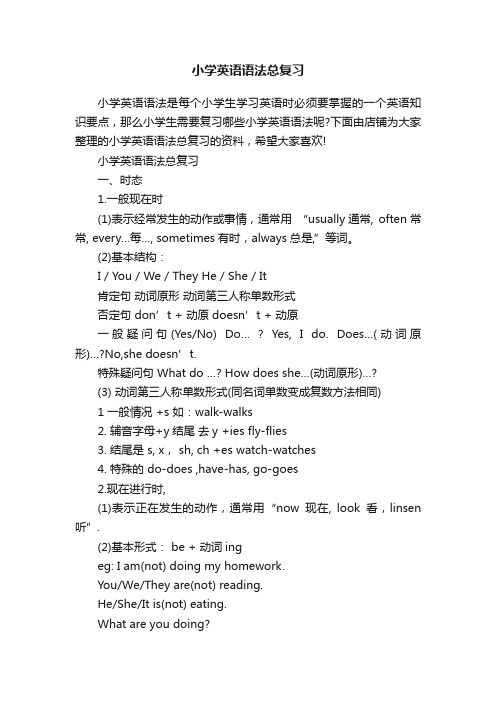
小学英语语法总复习小学英语语法是每个小学生学习英语时必须要掌握的一个英语知识要点,那么小学生需要复习哪些小学英语语法呢?下面由店铺为大家整理的小学英语语法总复习的资料,希望大家喜欢!小学英语语法总复习一、时态1.一般现在时(1)表示经常发生的动作或事情,通常用“usually通常, often常常, every…每…, sometimes有时,always总是,”等词。
(2)基本结构:I / You / We / They He / She / It肯定句动词原形动词第三人称单数形式否定句don’t + 动原doesn’t + 动原一般疑问句(Yes/No) Do… ? Yes, I do. Does…(动词原形)…?No,she doesn’t.特殊疑问句What do …? How does she…(动词原形)…?(3) 动词第三人称单数形式(同名词单数变成复数方法相同)1 一般情况 +s 如:walk-walks2. 辅音字母+y结尾去y +ies fly-flies3. 结尾是 s, x, sh, ch +es watch-watches4. 特殊的 do-does ,have-has, go-goes2.现在进行时,(1)表示正在发生的动作,通常用“now现在, look看,linsen 听”.(2)基本形式: be + 动词ingeg: I am(not) doing my homework.You/We/They are(not) reading.He/She/It is(not) eating.What are you doing?Is he reading?(3)动词的现在分词形式(动词+ing)一般情况 +ing walk—walking结尾是不发音的 e -e + ing come—coming重读闭音节双写最后一个字母+ing run-runningswim-swimming3. 一般过去时(1) 表示过去已经发生的事情,通常用“last …上一个…, just now 刚才, a moment ago刚才, yesterday昨天”等词。
小学英语常用万能句型汇总(共62个)(找到规律英语就很好学)
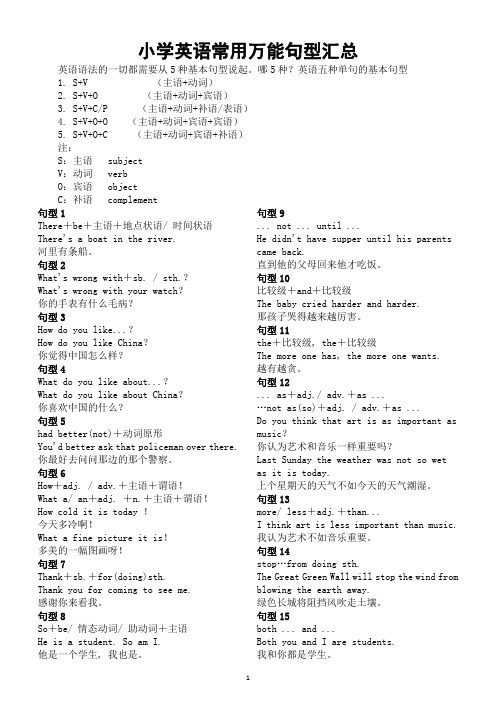
小学英语常用万能句型汇总英语语法的一切都需要从5种基本句型说起。
哪5种?英语五种单句的基本句型1. S+V (主语+动词)2. S+V+O (主语+动词+宾语)3. S+V+C/P (主语+动词+补语/表语)4. S+V+O+O (主语+动词+宾语+宾语)5. S+V+O+C (主语+动词+宾语+补语)注:S:主语 subjectV:动词 verbO:宾语 objectC:补语 complement句型1There+be+主语+地点状语/ 时间状语There's a boat in the river.河里有条船。
句型2What's wrong with+sb. / sth.?What's wrong with your watch?你的手表有什么毛病?句型3How do you like...?How do you like China?你觉得中国怎么样?句型4What do you like about...?What do you like about China?你喜欢中国的什么?句型5had better(not)+动词原形You'd better ask that policeman over there. 你最好去问问那边的那个警察。
句型6How+adj. / adv.+主语+谓语!What a/ an+adj. +n.+主语+谓语!How cold it is today !今天多冷啊!What a fine picture it is!多美的一幅图画呀!句型7Thank+sb.+for(doing)sth.Thank you for coming to see me.感谢你来看我。
句型8So+be/ 情态动词/ 助动词+主语He is a student. So am I.他是一个学生, 我也是。
句型9... not ... until ...He didn't have supper until his parents came back.直到他的父母回来他才吃饭。
小学英语语法知识总结
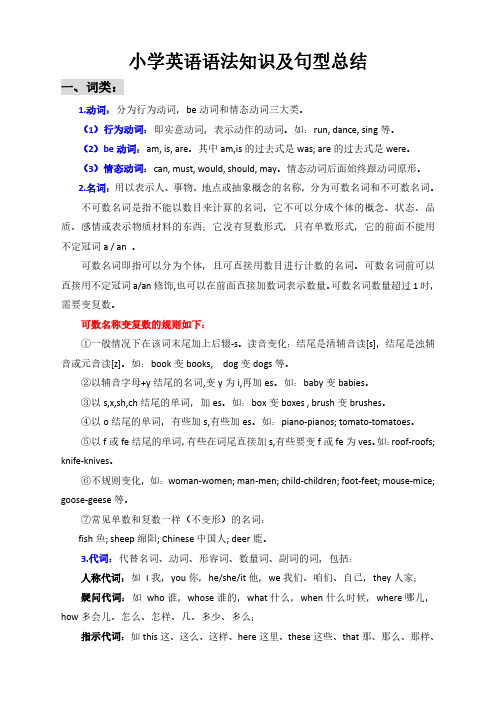
小学英语语法知识及句型总结一、词类:1.动词:分为行为动词,be动词和情态动词三大类。
(1)行为动词:即实意动词,表示动作的动词。
如:run,dance,sing等。
(2)be动词:am,is,are。
其中am,is的过去式是was;are的过去式是were。
(3)情态动词:can,must,would,should,may。
情态动词后面始终跟动词原形。
2.名词:用以表示人、事物、地点或抽象概念的名称,分为可数名词和不可数名词。
不可数名词是指不能以数目来计算的名词,它不可以分成个体的概念、状态、品质、感情或表示物质材料的东西;它没有复数形式,只有单数形式,它的前面不能用不定冠词a/an。
可数名词即指可以分为个体,且可直接用数目进行计数的名词。
可数名词前可以直接用不定冠词a/an修饰,也可以在前面直接加数词表示数量。
可数名词数量超过1时,需要变复数。
可数名称变复数的规则如下:①一般情况下在该词末尾加上后辍-s。
读音变化:结尾是清辅音读[s],结尾是浊辅音或元音读[z]。
如:book变books,dog变dogs等。
②以辅音字母+y结尾的名词,变y为i,再加es。
如:baby变babies。
③以s,x,sh,ch结尾的单词,加es。
如:box变boxes,brush变brushes。
④以o结尾的单词,有些加s,有些加es。
如:piano-pianos;tomato-tomatoes。
⑤以f或fe结尾的单词,有些在词尾直接加s,有些要变f或fe为ves。
如:roof-roofs; knife-knives。
⑥不规则变化,如:woman-women;man-men;child-children;foot-feet;mouse-mice; goose-geese等。
⑦常见单数和复数一样(不变形)的名词:fish鱼;sheep绵阳;Chinese中国人;deer鹿。
3.代词:代替名词、动词、形容词、数量词、副词的词,包括:人称代词:如I我,you你,he/she/it他,we我们、咱们、自己,they人家;疑问代词:如who谁,whose谁的,what什么,when什么时候,where哪儿,how多会儿、怎么、怎样、几、多少、多么;指示代词:如this这、这么、这样、here这里、these这些、that那、那么、那样、there那里、those那些”。
小学英语常用句型及语法
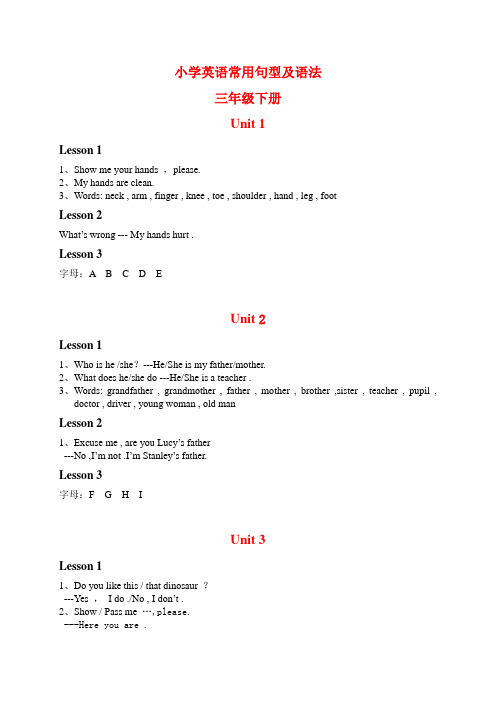
小学英语常用句型及语法三年级下册Unit 1Lesson 11、Show me your hands ,please.2、My hands are clean.3、Words: neck , arm , finger , knee , toe , shoulder , hand , leg , footLesson 2What’s wrong --- My hands hurt .Lesson 3字母:A B C D EUnit 2Lesson 11、Who is he /she?---He/She is my father/mother.2、What does he/she do ---He/She is a teacher .3、Words: grandfather , grandmother , father , mother , brother ,sister , teacher , pupil ,doctor , driver , young woman , old manLesson 21、Excuse me , are you Lucy’s father---No ,I’m not .I’m Stanley’s father.Lesson 3字母:F G H IUnit 3Lesson 11、Do you like this / that dinosaur ?---Yes ,I do ./No , I don’t .2、Show / Pass me…,please.---Here you are .3、words : dinosaur , robot , boat , kite , car , train , plane , bus , uncle ,aunt , cousinLesson 21、How many …s do you have---I have three …s.2、May I play with this toy---Of course . Here you are.3、What toys do you like best ?---I like … best.Lesson 3字母:J K L MUnit 4Lesson 11、Do you like …s?---Yes , I do. / No, I don’t.2、Have an apple.---Yes,please./No,thank you.3、What can you see in Box 1---I can see …4、words:apple , pear , orange ,banana , peach , cherry , watermelon, grape5、数字:11-15 (eleven , twelve ,thirteen , fourteen , fifteen )Lesson 21、What’s your favorite fruit---I like … best .2、Can I help you ?---Yes, please./No,thank you.3、How many …s do you want?---数词,please.Lesson 3字母:N O P Q RUnit 5Lesson 11、Can you see ducks over there?---Yes,I/We can./ No,I/We can’t.2、Look at these/those….3、What’s this/that---It’s a ….4、What are these/those?---They are …s.5、words:cow , horse , pig , hen , duck , tree , grass , flower , goose ,sheep , fishLesson 21、Welcome to …2、Let’s do like the animals.3、Sentences : (1)Jump like a rabbit. (2)Fly like a bird .(3)Walk like a duck . (4)Run like a dog.(5)Swim like a fish . (6)Sleep like a pig.Lesson 31、Do you have cats---Yes , I/We do . / No, I/We don’t.2、How many cats do you have---Three.3、字母:S T U VUnit 6Lesson 11、Is this your coat?---Yes, it is. /No,it isn’t.2、Which is your coat---The yellow one .3、Whose coat is it---It’s Lily’s.4、Whose pants are they---They are Lucy’s.5、words: coat , shirt , T-shirt , dress , skirt , hat , scarf , sweater , pants ,shoes , socks , glovesLesson 21、Are they nice shoes---Yes, they are . /No, they aren’t.2、How are these shoes---They are just right .3、sentence:(1)Wash our clothes . (2)Hang our clothes .(3)Fold our clothes . (4)Put away our clothes .Lesson 31、How much are they---They are …yuan.2、字母:W X Y Z四年级上册Unit 1Lesson 11、How are you?---I’m fine/Ok/happy/sad…2、称赞用语及回答:How beautiful!---Thank you.3、Do you have a new pen ---Yes , I do ./No, I don’t.4、Do you have new pens ---Yes , we do ./No ,we don’t.5、I have a new schoolbag.6、学科名词单词:Chinese ,math , music ,science , art , English , IT ,PE7、数词:16-20(sixteen , seventeen ,eighteen , nineteen ,twenty)8、How many books altogether---Seventeen books altogether.Lesson 21、复习句型:(1)How are you?(2)How many …s?2、新单词及词组:guess , try again , a/an的使用Lesson 3字母:A B C D EUnit 2Lesson 11、Do you know sb.---Yes ,I do.He(She) is … /No,he(she) isn’t .2、Where is he/she from?---He/She is from…3、Where are you from?---I’m from…4、国家名称:Canada , UK , China , USA , Australia ,South Africa5、形容词:tall , short , thin ,fatLesson 21、What does he like?---He likes music.Lesson 3字母:F G H IUnit 3Lesson 11、What does a panda look like ?---It’s black and white.2、Can we see …---Yes,we can./No,we can’t.3、动物单词:tiger , lion , elephant , hippo , giraffe , zebra , monkey , snake4、形容词:heavy , lovely , funny , strongLesson 21、Do you like monkeys?---Yes,I(We) do./No, I(We) don’t.2、Is it an elephant ?---Yes , it is ./No,it isn’t.3、I like …/I don’t like …4、短语:not at all , Why not?Lesson 3字母:J K L MUnit 41、What’s the matter?2、Is it in your bag?---Yes,it is./No, it isn’t.3、Where is the book?---It’s on the desk.4、words: door , window , wall , blackboard , desk , chair , TV , light , fan ,map , in ,on , underLesson 21、Who’s on duty today ---Jim is on duty today.2、短语:clean up , turn off , get to work , put up the map , at once , closethe door , turn on , open ,afterLesson 3字母:N O P Q RUnit 5Lesson 11、I’m hungry . Are you hungry2、What’s for tea3、Have an apple pie .4、Words : cookie , candy , pie , ice cream , egg , bread , water , juice , milk ,tea , hungry , thirsty5、I like…6、Like sb. to do sth.Lesson 21、What do you like ---I like …2、May I have some …---Sure .3、I’m hungry . /I’m thirsty .Lesson 3字母:S T U VUnit 61、Excuse me .2、May I have a seat ?---Sure ,this way ,please.3、Whose book is this ?---It’s Stanley’s.4、Where’s the sofa---In the living room .5、Words: house , living room , bedroom , dining room , bathroom , study ,kitchen ,bed , table , sofaLesson 21、形容词:large , bright , clean , tidy2、短语:come in , take a seat , have some drinks3、句型:May I …?(have a seat , have some bread , read a book , wash my hands ,watch TV , have an ice cream)4、颜色:green , orange , black , red , brownLesson 31、字母:W X Y Z2、Let me make the bed.(Set the table, watch TV , read a book , have a shower ,have a rest)四年级下册Unit 1Lesson 11、Go to …(地点)quickly.2、What’s in the room---There is a computer in the room .3、There is a picture on the wall .4、Is it for me5、Anything else6、Words: computer , lamp , clock , CD player , picture , umbrella , shelf ,end table , floor , beside , behindLesson 21、Welcome to …2、Is there a computer in your room?---Yes ,there is./No , there isn’t.3、介词:on,under , in ,beside, behindLesson 31、A的发音:长音和短音2、颜色:green , yellow , blue , purple , brown , red , orangeUnit 2Lesson 11、Come here.2、What’s my number---Your number is…3、Come on ,ready ,go!4、How many rabbits are there---There are 5 five rabbits.5、数词:21 twenty-one,22 twenty-two,30 thirty,40 forty,50 fifty,60sixty6、Words: carrot ,tomato , potato , cabbage ,banana, watermelonLesson 21、Good job!2、This prize is for you.3、How kind of you.4、Let’s count.Lesson 3字母E的发音:bee tenUnit 3Lesson 11、Look at …2、What’s the time?---It’s 9 o’clock.3、May we have ten more minutes4、Good night!5、It’s time for bed .6、Words: breakfast , lunch , dinner , get up , go to school , go to bed , inthe morning , in the afternoon , in the evening ,at nightLesson 21、Is there a panda show in the morning---Yes, there is ./No,there isn,t .2、What time is the panda show ---At 1:30.3、Let’s watch the panda show .4、时间的表示法Lesson 3字母I的发音:bike bigUnit 4Lesson 11、Can you play football?---Yes,I can./No,I can’t.2、Let me have a try .3、It’s easy to learn .4、Words: football , basketball , tennis , ping pong , cycling , swimming , hiking ,skiing , pass the ball , kick the ballLesson 21、Pass the ball to me .2、Don’t pass it to him .3、He can play football very well .4、短语:bounce the ball , roll the ball , kick the ball , dribble the ball ,pass the ball ,shoot the ballLesson 3字母O的发音:hole boxUnit 5Lesson 11、How’s the weather —It’s rainy.2、What about the afternoon ---It’s cloudy in the afternoon.3、Can I go skating ---Yes, you can ,/No, you can’t.4、Words : rainy , cloudy , snowy , sunny , windy , warm , hot , cool , cold ,wet , play tennis , go cycling , go skiingLesson 21、Who is it —It’s me.2、How nice to see you .3、词组:take off , put onLesson 3字母U的发音: music cupUnit 6Lesson 11、Where is the seal house---It’s in front of the shark house .2、Where are the penguins ---They are between the two trees .3、Let’s look at the map first .4、Words: seal , shark , turtle , whale , dolphin , penguin , crab , sea lion ,toilet , in front of , betweenLesson 21、What’s your favorite sea animal---My favorite sea animal is …2、Words : draw , cut , stick , behind , in front of ,betweenLesson 3字母A E I O U 的练习五年级上册Unit 1Lesson 11、May I help you?/ Can I help you---Yes, I want …,please.Lesson 21、What can I do for you/ What do you want---I want …,please.2、How much are they---They are … yuan .3、不可数名词的数量表示法:a pair of sunglasses, a bottle of yogurt , a bottleof coke , a bag of candies4、数词:70 seventy , 80 eighty , 90 ninety ,100 one hundred ,24 twenty-twoLesson 3B : bee , ball , book P : pea , pig , pinkD : deep , dolphin , doctor T : tea , teeth , today/i:/ :ee/ea(tea , teeth )Unit 2Lesson 11、What would you like for dinner/What do you have for …/What’s for breakfast2、Words : vegetable , noodle , dumpling , chicken , rice , soupLesson 21、Do you have a …/…s---Yes,I/ We do ./No , I/We don’t .2、words : spoon , plate , cup , chopsticks , fork , bowl , glassLesson 3Phonics : /k/ , /g/ , /f/ , /v/ , /i/Unit 3Lesson 11、询问别人建议(1) How /What about …(2) How do you like …2、words : squirrel , parrot , goldfish , lizard , friendly , noisy , quiet ,clumsyLesson 21、What do they like to do ---They like to do ….2、Words : eat , drink , fly , jump , sleep , swimLesson 3Phonics : /s/ , /z/ , /sh/ , /sure/ , /e/Unit 4Lesson 11、What day is it today --- It’s /Today is Monday .2、What do you have on Monday ---I often have …3、Words : Monday , Tuesday , Wednesday , Thursday , Friday , Saturday , SundyLesson 21、Let’s do sth.2、What do you do on Mondays ---I draw …3、Can you do … ---Good idea!/Sorry , I have to…4、Words : draw , dance , sing , play with the piano , play chess , play badmintonLesson 31、Phonics : /l/ , /m/ , /n/ , /an/ , /a/2、When is the monkey show It’s on Monday .3、What time ---At 8:20 am.Unit 5Lesson 11、Which class do you like best ---I like … best .2、Words : listen , speak , draw , write , read , runLesson 21、It’s time for class .2、Do you like IT class —Yes , I do .It’s very interesting .3、Words : interesting , easy , relaxing , exciting , difficult , boringLesson 3Phonics : /u/ , /ar/五年级下册Unit 1Lesson 11、What are you doing —I’m doing …2、What is he/she doing—He / She is doing …3、What’s the mother doing ---She is doing …4、Words : answering the phone , watering the flower , washing the dishes ,cleaning the house , doing homework , watching TVLesson 21、How’s the weather —It’s rainy.2、What are they doing —They are doing …3、Are you v-ing ---Yes ,I am ./No , I’m not .4、Are the monkeys v-ing ---Yes ,they are ,/No , they aren’t .5、Is the girl v-ing ---Yes ,she is ./No ,she isn’t.6、Words : drawing , studying , playing , skating , jumping , listeningLesson 3Phonics : /o/ , /h/ , /j/Unit 2Lesson 11、Why do you like spring best ---Because I can do…in spring .2、It’s good time to do something .3、Words :spring , summer , autumn , winter , go for a picnic , go fishing ,go boating , go skiingLesson 21、复习下周进行时2、What can you see in the sky —There are some …s.3、Words : sky , woods , river , beach , parkLesson 3Phonics : /w/ , /r/ , /or/ , /all/ , /aw/Unit 3Lesson 11、Where is Li Tao —He is looking for insects over there .2、What do you like doing —I like v-ing in winter .3、Words : sleeping , walking , dancing , making , ladybug , butterfly , ant ,snailLesson 21、What does Andy like doing after school---He likes collecting stamps .2、Do you like doing sth.—I have no idea .Is it any fun3、Words : collecting stamps , keeping pets , planting flowers , doing sportsLesson 3Phonics : /th/ ,/oo/Unit 4Lesson 11、What does your uncle do —He is a teacher .2、Words : teacher , engineer , policeman , nurse , cook , tennis player , pilotLesson 21、Do you know that man —Yes ,I do .He is a pilot.He is always busy .2、Words :busy , kind , helpful , patient , angry , happyLesson 3Phonics : /ch/ , /oo/ , /j/ , /ge/Unit 5Lesson 11、What are you going to do this weekend---We are going to visit a greenhouse tomorrow afternoon .2、May I go with you---Sure , it’s good to have you with us .3、How are you going to the zoo---I’m going there on foot .4、Are you going to visit your aunt by bus---Yes ,I am .5、Is he going to the beach on foot or by bike ---By bike .6、Words : on foot , by boat , by bike , by train , by bus , by planeLesson 21、What are you going to buy---Some eggplants and onions .2、words : eggplant , onion , cucumber , chilli , pumpkin , beanLesson 3Phonics : /tr/ , /dr/ , /ts/ , /ds/ , /ur/ ,/er/ ,/ir/ ,/or/ ,/ar/六年级上册Unit 1Lesson 11、When is the school trip —It’s in October.2、Words : January , February ,March , April , May , June , July , August ,September , October ,November ,DecemberLesson 21、What’s the date,today —It’s January 1st.2、When is the Mother’s DayLesson 3Phonics : /pl/ , /bl/ , /a-e/ , /ay/ , /ai/Unit 2Lesson 11、Where is the library ---It’s on the second floor .2、Words :library , teacher’s office , canteen , swimming pool , gym , playgroundLesson 21、It’s time for class .2、Where are you going —I’m going to the art room .3、Where is the music room ---It’s on the fifth floor .Lesson 3Phonics : /pr/ , /br/ , /i-e/ , /y/ , /igh/Unit 31、How does your sister go to the museum---Sometimes on foot , sometimes by taxi.2、How do you go …---By …3、Words : taxi , light rail train , subway , ship , museum , bookstore ,supermarketLesson 21、What are they going to do ---They are going to …2、Will you go shopping with me —Sure ./ Sorry .3、Let’s do sth.4、Words :take a walk , take a rest , take a picture , go shopping , go swimming ,go skatingLesson 3Phonics : /fl/ , /fr/ , /ou/ , /ow/Unit 4Lesson 11、Don’t pick fruit from the trees .2、What does this sign mean —It means …Lesson 2情态动词should 、must的用法1、We mustn’t fight with each other .2、We shouldn’t love each other .Lesson 3Phonics : /kl/ ,/gl/ , /oa/ , /ow/Unit 51、What’s your plan for this summer holiday---I’m going to take part in a race .2、words : take part in , take a trip , take training , nature park , Children’sPalace , go campingLesson 21、What can you do for these children —I/We can make them happy with our songs .2、Will you join the volunteer group —Yes, I will .3、Words : volunteer group , craft group , photography group , calligraphy groupLesson 3Phonics : /kr/ , /gr/ , /oy/ , /oi/六年级下册Unit 1Lesson 11、What would you like ---A big glass of coke .2、Let’s get sth. To eat .—Good idea .I’d like …3、May I help you —Three pizzas ,please .4、Words : chips , fried chicken , hamburger , pizza , sandwich , sweetcorn ,coffeeLesson 21、How do you like pizza —It’s delicious .2、Words : delicious , sweet , sour , bitter , saltyLesson 3Phonics : /sp/ , /sk/ , /ear/ , /eer/Unit 2Lesson 11、Excuse me ,where is the bank ---It’s next to the hospital .2、How can I get to your house ---Walk along the road to the bank…3、Words : bank , hospital , cinema , bus stop , traffic lights , overpass ,crosswalk , underpassLesson 21、What can you see in the first picture —I can see …2、Can you show me the way to the bank —Sure , it’s next to …3、Words: through , along , across , up , downLesson 3Phonics : /sl/ , /sm/ , /air/ , /ear/ , /are/Unit 3Lesson 11、Can you draw rain —Yes ,I can .It’s easy .2、Where does rain come from —It comes from …3、Words :rain , cloud , snow , lake , sea , mountainLesson 21、Turn on the computer .2、What can you see —I can see the earth.3、Words :earth , sun , moon , star , rainbowLesson 3Phonics : /sn/ , /st/ , /our/ , /ure/Unit 4Lesson 11、Are you ready for the trip---Yes ,I am ./No,I’m not .2、Don’t forget to take the towel .3、Words : towel , toothbrush , toothpaste , soap , camera , battery , flashlight ,raincoatLesson 21、What shall I take for this trip —You should take a cap with you .2、Words :cap , jacket , jeans , sandals , bootsLesson 3Phonics : /sw/ , /tw/ , /kw/ , /ind/Unit 5Lesson 11、Would you like to be a driver---No, I’d like to be a cook .Because …2、words : sportsman , scientist , astronant , artist , musician , dancer ,writer ,vetLesson 2Tell me about your …Lesson 3Phonics : /spr/ , /str/ , /n/ , /old/。
小学英语语法句型归纳总结

小学英语语法句型归纳总结英语作为一门国际语言,学习英语语法对于小学生来说是至关重要的。
掌握英语语法句型,不仅能够帮助学生更好地理解英语的用法,还能够提高他们的英语表达能力。
下面是对小学英语语法句型的归纳总结:一、简单句型1. 主语 + 动词(及物或不及物)例如:- I eat an apple.(我吃一个苹果。
)- They run in the park.(他们在公园里跑。
)2. 主语 + 动词 + 宾语例如:- She reads a book.(她读一本书。
)- Tom throws a ball.(汤姆扔一个球。
)3. 主语 + 系动词(be动词)+ 表语例如:- I am a student.(我是一个学生。
)- The flower is beautiful.(这朵花很漂亮。
)4. 主语 + 系动词(be动词)+ 地点例如:- The book is on the table.(书在桌子上。
)- The cat is under the chair.(猫在椅子下面。
)二、疑问句1. 一般疑问句使用助动词do、does或did加在句子的主语前,然后再加上动词原形。
例如:- Do you like ice cream?(你喜欢冰淇淋吗?)- Does he play basketball?(他打篮球吗?)2. 特殊疑问句特殊疑问句是用来询问特定信息或细节的问句,通常以疑问代词开头。
例如:- What is your name?(你叫什么名字?)- When is your birthday?(你的生日是什么时候?)- Where do you live?(你住在哪里?)在句子前面加上否定词,通常为don't、doesn't或didn't。
例如:- I don't like pizza.(我不喜欢披萨。
)- He doesn't have a pet.(他没有宠物。
pep小学英语总复习(句型-短语-语法)

pep⼩学英语总复习(句型-短语-语法)PEP 三到六年级的动词词组answer the phone接buy a present买礼物catch butterflies捉蝴蝶clean the room 打扫房间climb mountains爬⼭collect stamps收集邮票come from来⾃,从……来cook dinner做饭cook the meals做饭do an experiment做实验do homework做作业do morning exercises做早操do housework做家务do the dishes 刷碗drink water 喝⽔draw pictures画画eat breakfast吃早饭lunch ,午饭dinner,晚饭, at home 在家fly kites放风筝go to bed睡觉go to school上学go to the cinema去看电影go to a park 去公园go to work上班go home 回家go swimming 去游泳go fishing 去钓鱼go hiking 去郊游go ice-skating 去滑冰go skiing 去滑雪go shopping 去购物go straight 直⾏get up起床have a picnic举⾏野餐have breakfast吃早餐have lunch吃午餐have dinner吃晚饭have Chinese classhave English class上英语课have music class上⾳乐课have P.E. class上体育课have math class上数学课have a cold 感冒have a fever 发烧have a sore throat 嗓⼦疼have a headache 头疼have a toothache ⽛疼like + doing 喜欢做某事look at看……live in 居住listen to music听⾳乐learn Chinese (学中⽂) make a snowman堆雪⼈make kites制作风筝make the bed铺床plant trees种树play chess下棋sweep the floor扫地play football踢⾜球play ping-pong 打乒乓球play sports 做活动play the violin拉⼩提琴play the piano弹钢琴play with…… 玩… put on 穿上read a book看书read books看书read a magazine阅读杂志set the table摆餐具sing and dance (唱歌跳舞) take a trip去旅⾏take some medicine 吃些药see the doctor看医⽣take (took) pictures照相turn left 向左转turn right向右转visit grandparents看望(外)祖⽗母write a letter写信write an 写电⼦water the flowers浇花wash the clothes洗⾐服watch insects观察昆⾍watch TV看电视have to必须go there去那open the door开门close the window关窗by bike骑车in the morning在早晨in the afternoon在下午at night在晚上in the evening在夜晚last Sunday上个星期天on the weekend在周末⼩学英语四种时态复习。
3-6年级英语重点句型及语法-3~6英语必背语法
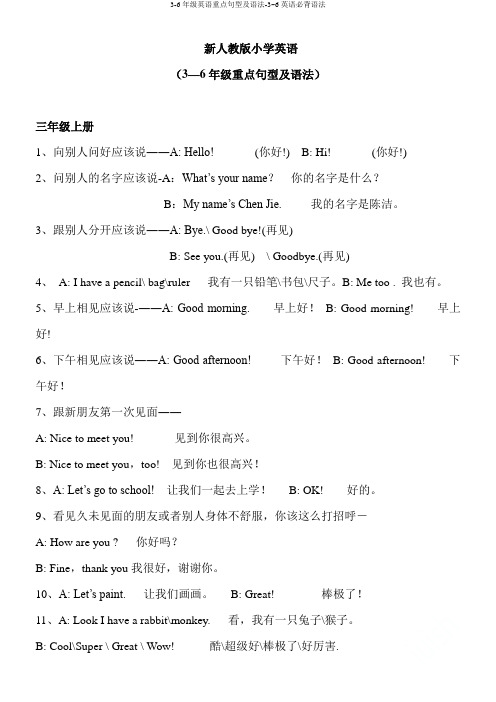
新人教版小学英语(3—6年级重点句型及语法)三年级上册1、向别人问好应该说――A: Hello! (你好!) B: Hi! (你好!)2、问别人的名字应该说-A:What’s your name?你的名字是什么?B:My name’s Chen Jie. 我的名字是陈洁。
3、跟别人分开应该说――A: Bye.\ Good bye!(再见)B: See you.(再见) \ Goodbye.(再见)4、A: I have a pencil\ bag\ruler 我有一只铅笔\书包\尺子。
B: Me too . 我也有。
5、早上相见应该说-――A: Good morning. 早上好!B: Good morning! 早上好!6、下午相见应该说――A: Good afternoon! 下午好!B: Good afternoon! 下午好!7、跟新朋友第一次见面――A: Nice to meet you! 见到你很高兴。
B: Nice to meet you,too! 见到你也很高兴!8、A: Let’s go to school! 让我们一起去上学!B: OK! 好的。
9、看见久未见面的朋友或者别人身体不舒服,你该这么打招呼-A: How are you ? 你好吗?B: Fine,thank you我很好,谢谢你。
10、A: Let’s paint. 让我们画画。
B: Great! 棒极了!11、A: Look I have a rabbit\monkey. 看,我有一只兔子\猴子。
B: Cool\Super \ Great \ Wow! 酷\超级好\棒极了\好厉害.12、你想看下别人的东西,你该这么说――A: May I have a look? 我可以看一看吗?B: Sure. Here you are! 当然可以。
给你!13、请别人吃东西,你该这么说――A: Have some French fries. 吃一些炸薯条。
小学英语语法汇总_学习总结_

小学英语语法汇总可数名词与不可数名词“分家”一、可数名词与不可数名词的区别普通名词所表示的人或事物是可以按个数计算的,这类名词叫可数名词。
可数名词分为个体名词(表示某类人或事物中的个体,如worker, farmer, desk, factory等)和集体名词(表示作为一个整体来看的一群人或一些事物,如people, family 等)。
如果普通名词所表示的事物是不能按个数来计算的,这类名词就叫不可数名词。
不可数名词分为物质名词(表示无法分为个体的物质,如meat, rice, water, milk, orange 等)和抽象名词(表示动作、状态、情况、品质等抽象概念,如work, homework, time, health, friendship等)。
二、可数名词的家务事可数名词有单数和复数两种形式。
指一个人或一件事物时,用单数形式;指两个或多个人或事物时用复数形式。
名词由单数形式变成复数形式的规则如下:1. 一般的名词词尾直接加-s 。
如:book → books room → roomshouse → houses day → days2. 以s, ss, ch, sh, x 结尾的名词,在词尾加-es 。
如:bus → buses glass → glasseswatch → watchesdish → dishes box → boxes3. 以"辅音字母+y"结尾的名词,要先将y改为i再加-es。
如:city → cities body → bodiesfactory → factories等等。
4. 以f 或fe 结尾的名词,要将f或fe改为v再加-es。
如:half → halves leaf → leavesknife → knives wife → wives5. 特例 [悄悄话:特例常常考,要记住。
]① child → children② man → men woman → womenpoliceman → policemen(规律:man → men)③ tomato → tomatoes potato → potatoes[悄悄话:初中英语以o 结尾的名词变复数时只有这两个词加-es,其余的当然加-s喽!如:photo → photos ]④ foot → feet tooth → teeth [悄悄话: oo变成ee。
小学英语语法
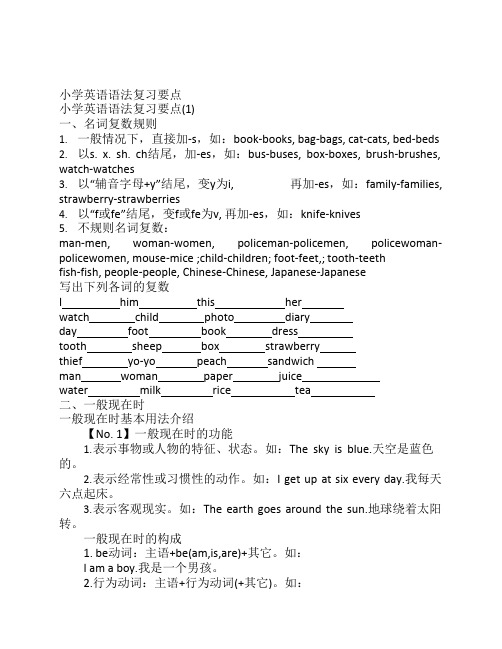
小学英语语法复习要点小学英语语法复习要点(1)一、名词复数规则1.一般情况下,直接加-s,如:book-books, bag-bags, cat-cats, bed-beds2.以s. x. sh. ch结尾,加-es,如:bus-buses, box-boxes, brush-brushes, watch-watches3.以“辅音字母+y”结尾,变y为i, 再加-es,如:family-families, strawberry-strawberries4.以“f或fe”结尾,变f或fe为v, 再加-es,如:knife-knives5.不规则名词复数:man-men, woman-women, policeman-policemen, policewoman- policewomen, mouse-mice ;child-children; foot-feet,; tooth-teethfish-fish, people-people, Chinese-Chinese, Japanese-Japanese写出下列各词的复数I him this herwatch child photo diaryday foot book dresstooth sheep box strawberrythief yo-yo peach sandwichman woman paper juicewater milk rice tea二、一般现在时一般现在时基本用法介绍【No. 1】一般现在时的功能1.表示事物或人物的特征、状态。
如:The sky is blue.天空是蓝色的。
2.表示经常性或习惯性的动作。
如:I get up at six every day.我每天六点起床。
3.表示客观现实。
如:The earth goes around the sun.地球绕着太阳转。
一般现在时的构成1.be动词:主语+be(am,is,are)+其它。
小学英语语法句型

小学英语语法句型构成及变化1、be动词的变化。
肯定句:主语+be(am,is,are)+其它。
如:I am a boy、我是一个男孩。
否定句:主语+ be + not +其它。
如:He is not a worker、他不是工人。
一般疑问句:Be +主语+其它。
如:-Are you a student? -Yes、 I am、 / No, Im not、特殊疑问句:疑问词+一般疑问句。
如:Where is my bike?2、行为动词的变化。
(1)当主语为第一,二人称及复数时,助动词为do肯定句:主语+动词原形(+其它)。
如:We often play basketball after school、否定句:主语+ dont+动词原形(+其它)。
如:we don’t play basketball after school、一般疑问句:Do +主语+动词原形+其它? 如:Do you often play basketball after school l? Yes, we do、 / No, we dont、特殊疑问句:疑问词+以do开头的一般疑问句? 如:What do you often do after school ?(2)当主语为第三人称单数时 ,助动词为does肯定句:主语+动词三单式(+其它)。
如:He swims well、否定句:主语+ doesn’t+动词原形(+其它)。
如:He doesn’t swim well、、一般疑问句:Does +主语+动词原形+其它。
如:Does he swim well ? Yes, he does、 / No, he doesnt、特殊疑问句:疑问词+以does开头的一般疑问句?如:How does your father go to work?三、第三人称单数的动词变化规则(只有在第三人称为主语的肯定句中,动词才用三单式)(1)多数动词直接加s:runs gets likes collets takes plays climbs……、(2)结尾是s, x, sh, ch, o,前为辅音字母,结尾加es :watches teaches goes does washes crosses mixes brushes(3)动词末尾y前为辅音:将y改为i加es:study→studies fly→flies carry→carries cry→cries但在y前如果为元音则直接加s:buys says四、时间标志:always , usually , often , sometimes ,every… 现在进行时一、意义当表示现在正在进行的动作或正在发生的事。
小学常用英语语法句型汇总

小学常用英语语法句型汇总一、名词句型1. 主语 + 动词 + 名词例句:The girl is playing soccer.翻译:这个女孩正在踢足球。
2. 主语 + be动词 + 名词例句:I am a student.翻译:我是一个学生。
3. 主语 + be动词 + 形容词例句:She is happy.翻译:她很开心。
4. 主语 + have + 名词例句:They have a dog.翻译:他们有一只狗。
5. 主语 + have + 可数名词复数例句:We have two apples.翻译:我们有两个苹果。
6. 主语 + have + 不可数名词例句:He has some milk.翻译:他有一些牛奶。
7. 主语 + have + 可数名词复数 + 名词例句:They have two books.翻译:他们有两本书。
二、动词句型1. 主语 + 动词原形 + 其他成分例句:He plays basketball every day.翻译:他每天打篮球。
2. 主语 + 动词原形 + 名词例句:We watch movies on weekends.翻译:我们周末看电影。
3. 主语 + 动词原形 + 副词例句:She runs fast.翻译:她跑得很快。
4. 主语 + 动词原形 + 不定式例句:I want to eat ice cream.翻译:我想吃冰淇淋。
5. 主语 + 动词原形 + 助动词例句:He can swim.翻译:他会游泳。
三、形容词句型1. 主语 + be动词 + 形容词例句:The weather is sunny.翻译:天气晴朗。
2. 主语 + be动词 + 形容词 + 名词例句:Her dress is beautiful.翻译:她的连衣裙很漂亮。
3. 主语 + be动词 + 形容词 + 不定式例句:The movie is interesting to watch. 翻译:这部电影很有趣。
小学英语语法总复习知识点归纳

小学英语语法总复习知识点归纳一、单词分类1. 名词(nouns):人(people)、动物(animals)、物品(objects)、地点(places)等。
2. 动词(verbs):表示一个人或物的动作、状态或存在。
分为动态动词(action verbs)和非动态动词(state verbs)。
3. 形容词(adjectives):用于描述或修饰名词。
4. 副词(adverbs):用于修饰动词、形容词、副词等。
5. 代词(pronouns):用于代替名词。
6. 冠词(articles):a、an、the。
7. 介词(prepositions):表示方向、位置、时间等的词。
8. 连词(conjunctions):连接词语、短语或从句的词。
9. 数词(numerals):表示数量的词。
二、句子结构1. 主语(subject):句子中执行动作或状态的人或事物。
2. 谓语动词(verb):表示主语所做的动作或状态的词。
3. 宾语(object):动作的承受者或与其相关的人或事物。
4. 定语(attributive):修饰名词或代词的词语。
5. 状语(adverbial):修饰动词、形容词、副词的词语。
6. 表语(predicative):说明主语的状态、特征、身份等的词语。
7. 插入语(interjection):发出强烈情感的句子中起修饰作用的词语。
三、基本句型1. 句子类型:陈述句(declarative sentence)、疑问句(interrogative sentence)、祈使句(imperative sentence)、感叹句(exclamatory sentence)。
2.陈述句:主语+谓语动词+其他成分。
3.疑问句:疑问词+助动词/情态动词+主语+谓语动词+其他成分?4.祈使句:谓语动词+其他成分。
5.感叹句:感叹词+其他成分。
四、时态1. 一般现在时(Simple Present Tense):主语+谓语动词原形。
小学英语总复习重点单词短语句型语法总汇
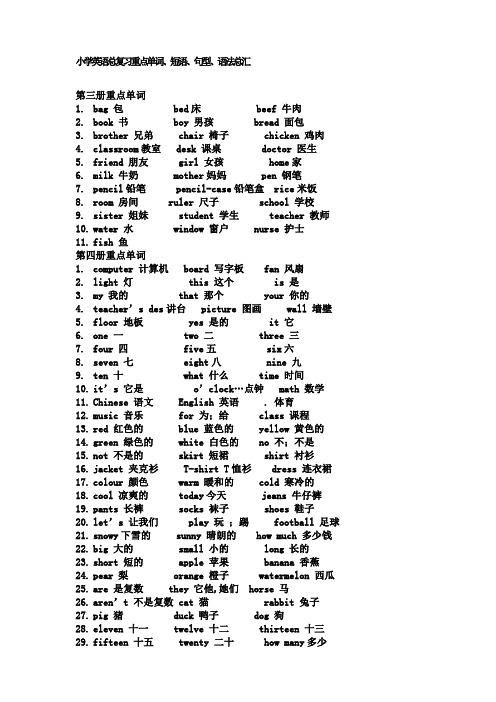
小学英语总复习重点单词、短语、句型、语法总汇第三册重点单词1.bag 包 bed床 beef 牛肉2.book 书 boy 男孩 bread 面包3.brother 兄弟 chair 椅子 chicken 鸡肉4.classroom教室 desk 课桌 doctor 医生5.friend 朋友 girl 女孩 home家k 牛奶 mother妈妈 pen 钢笔7.pencil铅笔 pencil-case铅笔盒 rice米饭8.room 房间 ruler 尺子 school 学校9.sister 姐妹 student 学生 teacher 教师10.water 水 window 窗户 nurse 护士11.fish 鱼第四册重点单词puter 计算机 board 写字板 fan 风扇2.light 灯 this 这个 is 是3.my 我的 that 那个 your 你的4.teacher’s des讲台 picture 图画 wall 墙壁5.floor 地板 yes 是的 it 它6.one 一 two 二 three 三7.four 四 five五 six六8.seven 七 eight八 nine 九9.ten 十 what 什么 time 时间10.it’s 它是o’clock…点钟 math 数学11.Chinese 语文 English 英语 . 体育12.music 音乐 for 为;给 class 课程13.red 红色的 blue 蓝色的 yellow 黄色的14.green 绿色的 white 白色的 no 不;不是15.not 不是的 skirt 短裙 shirt 衬衫16.jacket 夹克衫 T-shirt T恤衫 dress 连衣裙17.colour 颜色 warm 暖和的 cold 寒冷的18.cool 凉爽的 today今天 jeans 牛仔裤19.pants 长裤 socks 袜子 shoes 鞋子20.let’s 让我们 play 玩;踢 football 足球21.snowy下雪的 sunny 晴朗的 how much 多少钱22.big 大的 small 小的 long 长的23.short 短的 apple 苹果 banana 香蕉24.pear 梨 orange 橙子 watermelon 西瓜25.are 是复数 they 它他,她们 horse 马26.aren’t 不是复数 cat 猫 rabbit 兔子27.pig 猪 duck 鸭子 dog 狗28.eleven 十一 twelve 十二 thirteen 十三29.fifteen 十五 twenty 二十 how many多少30.there 那儿;那里第五册重点单词1.smart 聪明的 old 年老的 thin 瘦的2.funny 滑稽可笑的 tall 高的 active活跃的3.but 但是 quiet 安静;文静的very 很;非常4. young 年轻的 strong 强壮的 kind和蔼亲切的5. Mr. 先生 short 矮的 like 像;喜欢6. strict严格的who’s=who is是谁what’s=what is是什么7. he’s=he is他是she’s=she is她是 Monday星期一8. Tuesday 星期二 Wednesday星期三 Thursday星期四9. Friday 星期五 Saturday星期六 Sunday 星期天10. day 天;日子 have 有;吃 on在……时候11. too 太;也 grape 葡萄don’t=do not不要水果 salty咸的 fresh 新鲜的最喜爱的tasty 好吃的 fish 鱼茄子酸的 we 我们 lunch午饭;中餐西红柿 potato 土豆 tofu 豆腐beans青豆they’re=they are 他她;它们是窗帘 trash bin 垃圾桶 closet 衣橱镜子 end table 床头柜 bedroom卧室厨房 bathroom 卫生间 living room 客厅20. in 在…里 on 在…上 under 在…下21. near在…附近 behind 在…后面 clothes 衣服22. river 河流 flower 花 grass 草23. lake 湖泊 forest 森林 path 小路24. park 公园 house房子 bridge 桥25. tree 树木 road 路;公路 building 建筑物26. clean 干净的 eggplant 茄子 sweet 甜的第五册重点短语1. English teacher2. math teacher英语老师数学老师3. Chinese teacher4. have an English class语文老师上一节英语课5. on Wednesdays6. do my homework在星期三做作业TV 8. read books看电视看书9. play computer games 10. my favourite玩计算机游戏我最爱的11. favourite fruit 12. sweep the floor最喜欢的水果扫地13. cook the meals 14. clean the room做饭清洁房间15. water the flowers 16. wash the clothes浇花洗衣服17. set the table 18. make the bed摆餐具铺床19. do the dishes 20. clean the bedroom洗碗碟清洁卧室21. use a computer 22. near the table用计算机桌子旁边23. under the bed 24. over the river床下河上方25. on the desk 26. behind the door书桌上门后面27. in the closet 28. a picture of my room衣橱里一张我房间的照片第六册重点单词1. Apr.四月 at 在……点钟 Aug. 八月2. because 因为 best 最;极 birthday 生日3. date日期 Dec. 十二月 evening夜晚;晚上4. fall 秋天 Feb. 二月 fly 飞5. grandpa爷爷;外公 her 她的 Jan. 一月6. July 七月 June 六月 May 五月7. Mar. 三月 Mom 妈妈 noon 中午8. Nov. 十一月 Oct. 十月 often 经常9. season 季节 Sept. 九月 skate 滑冰10. sleep 睡觉 sometimes有时候 spring 春天11. summer 夏天 swim 游泳 uncle 叔叔12. usually 通常;一般 why 为什么 weekend周末13. which 哪一个 winter 冬天 honey 蜂蜜14. study 书房 jump 跳 run 跑15. kangaroo 袋鼠 climb 往上爬 fight 打架16. swing 荡;荡秋千第六册重点短语1. do morning exercises2. eat breakfast晨练吃早饭3. eat dinner4. fly kites吃晚饭放风筝5. get up6. go hiking起床去远足7. climb mountains 8. climb trees爬山爬树9. go shopping 10. have English class购物上英语课11. make a snowman 12. plant trees堆雪人种树13. play sports 14. play the piano进行体育运动弹钢琴15. visit grandparents 16. draw pictures看望祖父母画画17. cook dinner 18. read a book做饭看书19. answer the phone 20. listen to music接电话听音乐21. clean the room 22. write a letter打扫房间写信23. write an e-mail 24. drink water写电子邮件喝水25. watch insects 26. take pictures观察昆虫照相27. pick up leaves 28. do an experiment采摘树叶做实验29. catch butterflies 30. count insects捉蝴蝶数昆虫31. collect leaves收集树叶32. write a report写报告33. play chess 下棋 34. have a picnic举行野餐第七册重点单词1.by经;乘… foot脚 bike 自行车2.bus 公共汽车 train 火车 how 怎样3.traffic交通 stop停;停车站 wait等;等待4.library 图书馆 post office 邮局 hospital 医院5.cinema 电影院 bookstore 书店 where 哪里6.please 请 turn转弯 right 右边7.left 左边 straight 成直线地 then然后ic book 漫画书 post card 明信片 newspaper报纸9.buy购买 hobby爱好 dive 跳水10.live 居住 teach教 go 去11.watch 观看 read 读;看 does 助动词12.doesn’t否定助动词 singer 歌唱家 writer作家13.actor 男演员 actress 女演员 artist 画家 reporter电视台记者 engineer 工程师15.accountant 会计 policeman 警察16.salesperson 销售员 cleaner 清洁工17.work 工作 rain 雨;下雨 cloud 云;云彩18.sun 太阳 stream 小溪;小河 seed 种子19.soil 泥土 sprout 苗;嫩芽 plant 植物;种植20.should 应该 then 然后第七册重点短语1.on foot 走路2. by train 坐火车3. by bus4. by bike坐公共汽车骑自行车plane 6. stop at a red right坐飞机红灯停at a yellow light 8. go at a green light黄灯等绿灯走9. traffic light 10. near the post office交通灯邮局附近11. next to the hospital 12. turn left医院隔壁与医院相邻转左13. turn right 14. go straight转右直走15. get on 16. get off上车下车a trip 18. read a magazine去旅行看杂志19. go to the cinema 20 . this morning看电影今天早上21. this afternoon 22. this evening今天下午今天晚上23. next week 24. collect stamps下周集邮25. make kites 26. ride a bike制作风筝骑自行车27. play the violin 拉小提琴 28. go to work 上班29. watch TV at night 30. read newspapers晚上看电视看报纸31. teach English 32. live in Beijing教英语住在北京33. come from 34. plant flower seeds来自种花种第八册重点单词:1.taller 更高的 shorter 更矮的 stronger 更强壮的2.older 年纪更大的 younger更年轻的 bigger更大的3.heavier 更重的 longer更长的 thinner更瘦的4.smaller 更小的 hurt疼痛:受伤 matter事情5.sore 疼的 nose 鼻子 tired 疲劳的6.excited 兴奋的 angry 生气的 happy高兴的7.bored 无聊的 sad 伤心的 last上一个;最后的8.weekend 周末 to 向:朝 park 公园9.Chinese 汉语;中国的good 好的 present礼物10.boat 小船 elephant大象 how 怎样;多么11.watch-watched观看 wash-washed洗12.clean-cleaned 打扫 play-played玩13.visit-visited看望;拜访;参观 do-did做14.go-went 去 read-read 读:阅读15.learn-learned 学习 dance- danced跳舞16.eat-ate吃 take-took 照;拍17.climb-climbed 爬 have-had 有18.buy-bought 买 row-rowed 划19.see-saw看见 leave-left 离开20.get-got 到达第八册重点短语1.taller than…比……高2. have a fever 发烧2.have a cold 感冒 4. have a toothache 牙疼5. have a headache 头疼6. have a sore throat 喉咙疼7. watch TV 看电视 8. wash clothes 洗衣服9. play football 踢足球 10. visit grandparents 看望祖父母11. go to a park 去公园 12. read a book 看书7. go swimming 去游泳 8. go fishing 去钓鱼9. went hiking 去远足 10. learn Chinese 学习汉语11. sing and dance 唱歌跳舞 good food 吃美食1.take pictures 照相 14. buy presents 买礼物2.row a boat 划船 16. see elephant 看大象3.go skiing 去滑雪 18. go ice-skating 去滑冰第四册重点句型1.This is my computer. 这是我的计算机;2.That is your computer. 那是你的计算机;3.Is this a teacher’s desk 这是讲台吗4.Yes, it is. 是的,它是;5.What time is it 几点了6.It’s two o’cloc k. 两点锺了;7.It’s 9:45. It’s time for math class.8.九点四十五分了;该上数学课了;9.Is this your T-shirt 这是你的T恤衫吗10.No, it isn’t. 不,不是;11.What colour is it 它是什么颜色的12.It’s white. 它是白色的;13.It’s warm today. 今天很暖和;14.Let’s play football. 让我们踢足球吧;15.It’s cool. 天气凉爽;16.Is it cool 天气凉爽吗17.How much is it 它要多少钱18.It’s ten yuan. 它要十元钱;19.How much are they 它们要多少钱20.They’re three yuan. 它们要三元钱;21.Are they ducks 它们是鸭子吗22.No, they aren’t. 不,它们不是;23.How many horses are there 有多少匹马24.Twelve.十二匹;第五册重点句型1.Who’s your English teacher 你的英语老师是谁2.Mr. Carter. 卡特先生;3.Wh at’s he like 他是什么样子的4.He’s tall and strong. 他又高又强壮;5.Is she quiet 她文静吗6.No, she isn’t. She’ very active. 不,她不是;她很活跃;7.Is she strict 她严格吗8.Yes, she is. 是的,她是;9.But she’s very kind. 但她很亲切;10.What day is it today 今天是星期几11.It’s Wednesday. 是星期三;12.What do you have on Thursdays 星期四你有上什么课13.We have English, math and science.星期四我们有上英语、数学和科学;14.What do you do on Saturdays 星期六你做什么15.I watch TV on Saturday. 星期六我看电视;16.What about you, Chen Jie 陈洁,你呢17.I do my homework, too.我也做作业;18.What do you have for lunch on Mondays星期一午饭你你们吃什么19.We have tomatoes, tofu and fish. 我们吃西红柿、豆腐和鱼;20.What’s your favourite fruit 你最爱的水果是什么21.I like apples. They’re sweet. 我喜欢苹果;它们甜;22.I like fruits. But I don’t like grapes.我喜欢水果;但我不喜欢葡萄;23.They’re sour. 它们酸;24.What can you do 你会做什么25.I can sweep the floor. 我会扫地;26.I can cook the meals. 我会煮饭;27.I can water the flowers. 我会浇花;28.Can you make the bed No, I can’t. 你会铺床吗不会;29.Can you use a computer 你会使用计算机吗30.Yes, I can. 会,我会;31.There are two bedrooms, a kitchen, a bathroom and a living room.那有两间卧室、一个厨房、一个卫生间和一个起居室;32.There’s a mirror, a bed and a big closet.那有一面镜子、一张床和一个大衣橱;33.Many clothes are in the closet. 许多衣服在大衣橱里面;34.The trash bin is behind the door. 垃圾箱在门后面;35.Is there a forest in the park Yes, there is.在公园里有森林吗有;36.Is there a river No, there isn’t. 有河流吗没有;37.Are there any pandas in the mountains No, there aren’t.在山上有一些熊猫吗没有;38.Are there any fish in the river Yes, there are. 在河里有鱼吗有;第六册重点句型1.When do you eat dinner 你什么时候吃晚饭2.I eat dinner at 7:00 in the evening. 我晚上7:00吃晚饭;3.When do you get up 你什么时候起床4.I usually get up at 12:00 at noon. 我通常中午12:00起床;5.What do you do on the weekend 你周末做什么ually I watch TV and go shopping. 我通常看电视和买东西;7.Sometimes I visit my grandparents. 我有时看望祖父母;8.I often play football. Sometimes I go hiking.我经常踢足球;有时去远足;9.Which season do you like best 你最喜欢哪一个季节10.I like winter best. 我最喜欢冬天;11.Summer is good, but fall is my favourite season.夏天不错,但秋天是我最喜欢的季节;12.Why do you like summer 你为什么喜欢夏天13.Because I can swim in the lake. 因为我可以在湖里游泳;14.Why do you like winter 你为什么喜欢冬天15.Because I can sleep a long time. 因为我可以睡长一点;16.When is your birthday 你的生日是什么时候17.It’s in May. 在五月;18.My birthday is in June. 我的生日在六月;19.Uncle Bill’s birthday is in June, too. 比尔叔叔的生日也在六月;20.Is her birthday in June Yes, it is. 她的生日在六月吗是的;21.What’s the date 是几号22.June 9th .六月九日;23.Who’s that This is Zhang Peng. 电话中你是谁我是张鹏 ;24.What are you doing 你在干什么25.I’m doing the dishes. 我在洗碗碟;26.I’m reading a book. 我在看书;27.Grandpa is writing a letter. 爷爷在写信;28.Brother is doing homework. 哥哥在做作业;29.Mom is cooking dinner in the kitchen. 妈妈在厨房里做饭;30.He’s writing an e-mail in the study. 他在书房里写电子邮件;31.What is it doing 它在干什么32.It’s eating bananas. 它在吃香蕉;33.She’s jumping. 她在跳;34.What are they doing 它们在干什么35.They are swimming. 它们在游泳;36.They are climbing trees. 它们在爬树;37.Are you eating lunch 你们在吃午餐吗No, we aren’t. 不,我们不是;Are they eating the honey 它们在吃蜂蜜吗Yes, they are. 是的,它们是;Is he playing chess 他在下棋吗Yes, he is. 是的,他在;Is she counting insects 她在数昆虫吗No, she isn’t. 不,她不在;第七册重点句型1.How do you go to school ,Sarah莎拉,你怎样上学2.ually I go to school on foot我通常走路上学4.Sometimes I go by bike. 有时骑车;5.How can I get to Zhongshan Park 我怎样去中山公园6.You can go by the bus. 你可以坐15路车去;7.where is the cinema, please 请问电影院在哪里8.It’s next to the hospital. 它在医院旁边;9.Turn left at the cinema, then go straight. 在电影院转左,然后直走;10.It’s on the left. 它在左边;11.What are you going to do on the weekend周末你打算做什么12.I’m going to visit my grandparents this weekend.我这个周末打算去看望祖父母;13.Where are you going this afternoon 今天下午将去哪里14.I’m going to the bookstore. 我将去书店;15.What are you going to buy 你准备买点什么16.I’m going to buy a comic book. 我准备买一本漫画书;17.what’s your hobby 你的爱好是什么18.I like collecting stamps.我喜欢集邮;19.He likes collecting stamps, too. 他也喜欢集邮;20.Does she teach English No, she doesn’t. 她教英语吗不是;21.Does she teach you math Yes, she does.她教你们数学吗是的;22.What does your mother do 你的妈妈干什么工作23.She is a TV reporter. 她是电视台记者;24.Where does she work 她在哪里上班25.She works in a library. 她在图书馆上班;26.How does she go to work 她怎样上班27.She goes to work by bus. 她坐公共汽车上班;28.Where does the rain come from 雨来自哪里29.It comes from the clouds. 它来自云;30.How do you do that 你怎样做31.What should you do then 然后你应该做什么第八册重点句型1.How tall are you 你多高2.I’m 164cm tall. 我164厘米高;3. I’m shorter than you . 我比你矮;4.You’re 4cm taller than me . 你比我高4厘米;5.How heavy are you 你多重6.I’m 48kg. 我48公斤重;7.I’m thinner than you, and shorter. 我比你瘦,比你矮;8.I’m bigger and stronger than you . 我个子比你大,比你强壮;9.How do you feel 你感觉怎么样10.I feel sick. 我觉得不舒服;11.What’s the matter 怎么啦12.I have a headache..toothache, cold, fever, sore throat.我头疼;牙疼,感冒,发烧,喉咙疼13.My throat is sore. 我的喉咙疼;14.My nose hurts. 我的鼻子伤了;15.How are you, Liu Yun 刘云,你怎么样16.You look so happy. 你看起来这么快乐;17.I’m excited. 我兴奋;18.How are you, Sarah 莎拉,你怎么样19.You look sad today. 你今天看起来伤心;20.What did you do last weekend 上个周末你做什么21.I played football. 我踢足球;22.I visited my grandparents. 我拜访祖父母;23.What did you do yesterday 你昨天做了什么24.I went fishing. 我去钓鱼;25.Did you read books 你看了书吗26.Yes, I did. 看了;27.Did you clean your room 你打扫了房间吗28.No, I didn’t. 没有;29.Where did you go on your holiday 假日你去了哪里30.I went to Xinjiang. 我去了新疆;31.How did you go there 你怎样去那的32.I went by train. 我坐火车去的;小学英语单词按字母顺序列示Aactive积极的;活跃的 actor男演员 actress 女演员 accountant会计and和 angry生气的 answer the phone接电话 apple苹果 Apr.四月缩写aren’t = are not are是 artist 画家what about……怎么样 at在…点钟 Aug. 八月缩写Bbanana 香蕉 bag包 bathroom卫生间 because因为 bedroom 卧室bed床 beef牛肉 behind在……后边 best最;极 bigger体型更大的 big大的 bike自行车 birthday生日 blue 蓝色的 board 写字板boat 小船 book 书 bored无聊的,烦人的 boy男孩 bread面包bridge桥brother兄弟building 建筑物but 但是buy 购买buy—bought 买 by 经…;乘Ccan’t = can not cat 猫 catch butterfly捉蝴蝶 chair椅子 chicken 鸡肉 Chinese 语文 Chinese 中文,汉语 cinema电影院 class 课程classroom教室 clean the bedroom打扫卧室 clean the room打扫房间clean—cleaned打扫 cleaner 清洁工 clean干净的 climb mountains爬山 climb—climbed 爬 climb往上爬 closet壁橱;衣橱 clothes衣服cloud云;云彩cold 寒冷的 collect stamps集邮ing形式:collecting stampscolour 颜色 come from来自…;从…来 computer 计算机 cool 凉爽的Ddance—danced 跳舞 date日期 day天;日子 Dec. 十二月缩写 desk课桌;书桌 dive跳水ing形式:diving do homework 做作业 doctor医生 do—did does doesn’t = does not dog 狗don’t =do not door门 dress 连衣裙 drink water喝水 driver司机 duck 鸭子Eeat breakfast吃早饭 eat dinner吃晚饭 eat—ate吃 egg蛋 eight 八elephant大象eleven十一English英语evening夜晚;晚上excited兴奋的Ffall秋天 farmer农民 father父亲;爸爸 favourite特别喜爱的 Feb.二月缩写 fifteen 十五 fight打架 fish 鱼 five 五 flower花fly kites放风筝 fly飞 foot 脚 football 足球 for为;给 T-shirt T 恤衫 fresh 新鲜的 FridayFri.星期五 friend朋友 funny 滑稽可笑的Gget to 到达 get up起床 get—got 到达 girl女孩 go fishing—went fishing 去钓鱼go hiking—went hiking 去郊游go hiking去远足go ice-skating—went ice-skating 去滑冰go shopping购物;买东西go skiing—went skiing 去滑雪 go swimming—went swimming去游泳 go to school 上学 go 去第三人称单数goes good 好的 go—went去 grandpa爷爷;外公 grape 葡萄 grass 草 green beans青豆 green 绿色的Hhappy高兴的 have a cold感冒 have a fever 发烧 have a headache 头疼 have a picnic举行野餐 have a sore throat喉咙疼 have a toothache 牙疼 have English class上英语课 have—had have有;吃he’s = he is heavier 更重的 her她的 hobby 爱好 home家 honey蜂蜜 horse 马 hospital医院 house 房子;住宅 how many多少 how much多少钱 how 怎样 how怎么,如何 hurt疼痛Iin 在……里面 is 是 it 它it’s = it isJjacket夹克衫 Jan.一月缩写 jeans 牛仔裤 July七月 jump跳 June六月Kkangaroo袋鼠 kind和蔼;亲切的 kitchen厨房Llake 湖泊 last 上一个 last仅余的,留在最后的 learn—learned 学习 left 左边let’s = let us library 图书馆 like像;喜欢 listen to music听音乐live 居住第三人称单数形式:lives living room客厅;起居室 long 长的 longer 更长的 lunch 中餐;午餐Mmake a kites制作风筝 ing形式:making a kites make a snowman堆雪人 make the bed 铺床 Mar.三月缩写 math 数学 matter事情,麻烦 May五月 milk牛奶mirror 镜子 mom妈妈 MondayMon.星期一 mother母亲;妈妈 Mr先生 music音乐 my我的Nnear 在……旁边 newspaper 报纸 next next week下周 nine 九 noon中午nose 鼻子 not 不;不是的 Nov. 十一月缩写 no不;不是 nurse护士Oo’clock…点钟 Oct.十月缩写 often经常 old 年老的 older 年龄更大的 on 在……上面 one一 on在……时候 orange橙子P. 体育 pants 长裤 park 公园 path 路;小道 pear梨 pencil-case铅笔盒pencil铅笔 pen钢笔 pick up leaves采摘树 picture 图画;照片 picture 照片 pig猪 plant trees种树 plant 植物;种植 play chess下棋 play sports 进行体育运动 play the piano弹钢琴 play the violin 拉小提琴ing形式:playing the violin play—played玩 play玩;踢 please请 policeman男警察 post card 明信片 post office邮局 potato 土豆 present 礼物Qquiet安静的;文静的Rrabbit兔子 rain 雨;下雨 read a book看书 read books 读书 read 读;看第三人称单数:reads read—read 读 red 红色的 rice米饭 ride a bike骑自行车ing形式:riding a bike right 右边 river河流 road公路;大道 room房间 row—rowed 划船 ruler尺子 run跑Ssad 忧伤的,悲伤的 salesperson 销售员 salty咸的 SaturdaySat.星期六school学校 season季节 seed种子 see—saw看见 Sept.九月缩写 set the table摆饭桌;摆餐具 seven七she’s = she is shirt 衬衫 shoes 鞋子 short 矮的short 短的shorter 更矮的should 应该singer歌唱家;歌手sing—sang 唱歌 sister姐妹 six 六 skate滑冰;滑冰鞋 skirt 裙子 sleep 睡觉 sleep睡觉 smaller 体型更小的 small小的 smart聪明;巧妙的 snowy下雪的 socks 袜子 soil土壤 sometimes有时候 sore 疼的 sour 酸的 spring春天 sprout苗;芽;嫩芽 straight成直线的 stream 小河;小溪 strict 严格的stronger 更强壮的 student学生 study书房 summer夏天 sun 太阳 SundaySun.星期日 sunny晴朗的 sweep the floor扫地 sweet甜的 swim游泳 swim游泳swing荡;荡秋千Ttake pictures照相 take—took 照;拍 taller更高的 tall高的 tasty好吃的;可口的 teach 教第三人称单数:teaches teacher’s desk讲台 teacher教师ten十 that 那;那个then 然后 then 然后 there那儿;那里 they 它他、她们they’re = they are thinner 更瘦的thin瘦的thirteen十三this afternoon今天下午 this evening今天晚上 this morning 今天上午 this这;这个 three三 ThursdayThu.星期四 tired疲劳的,累的 to 向;朝 to 与……相邻 today 今天 tofu豆腐 tomato 西红柿 too 也;太 traffic light交通灯traffic rule交通规则 traffic 交通 train 火车 trash bin垃圾箱 tree树TuesdayTue.星期二 turn转弯 TV reporter电视台记者 twelve十二 twenty二十 two二U2.现在进行时的肯定句基本结构为be+动词ing.3.现在进行时的否定句在be后加not;4.现在进行时的一般疑问句把be动词调到句首;动词加ing的变化规则1.一般情况下,直接加ing,如:cook-cooking2.以不发音的e结尾,去e加ing,如:make-making, taste-tasting3.如果末尾是一个元音字母和一个辅音字母,双写末尾的辅音字母,再加ing,如:run-running, stop-stopping四、be going to1.be going to 表示将要发生的事或打算、计划、决定要做的事情;2.肯定句:be going to +动词原形,如:Jim is going to play football. 否定句:be not going to +动词原形,如:Jim is not going to play football. 一般疑问句:把be动词调到句首,如:Is Jim going to play football 特殊疑问句:疑问词+be+主语+going to+动词原形如:What is Jim going to do 疑问词当主语时:疑问词+be+going to+动词原形如:Who is going to play football 五、一般过去时1.一般过去时表示过去某个时间发生的动作或存在的状态,常和表示过去的时间状语连用;一般过去时也表示过去经常或反复发生的动作感谢;2.Be动词在一般过去时中的变化:⑴am 和is在一般过去时中变为was;wasnot=wasn’t ⑵are在一般过去时中变为were;were not=weren’t ⑶带有was或were的句子,其否定、疑问的变化和is, am, are一样,即否定句在was或were后加not,一般疑问句把was或were调到句首;3.句中没有be动词的一般过去时的句子否定句:didn’t +动词原形,如:Jim didn’t go home yesterday. 一般疑问句:在句首加did,句子中的动词过去式变回原形;如:Did Jim go home yesterday 特殊疑问句:⑴疑问词+did+主语+动词原形如: What did Jim do yesterday ⑵疑问词当主语时:疑问词+动词过去式如:Who went to home yesterday动词过去式变化规则:1.一般在动词末尾加-ed,如:pull-pulled, cook-cooked2.结尾是e加d,如:taste-tasted3.末尾只有一个元音字母和一个辅音字母的重读闭音节,应双写末尾的辅音字母,再加-ed,如:stop-stopped4.以“辅音字母+y”结尾的,变y为i, 再加-ed,如:study-studied5.不规则动词过去式: am,is-was, are-were, do-did, see-saw, say-said, give-gave, get-got, go-went, come-came, have-had, eat-ate, take-took, run-ran, sing-sang, put-put, make-made, read-read, write-wrote, draw-drew, drink-drank, fly-flew, ride-rode, speak-spoke, sweep-swept, swim-swam, sit-sat六年级英语语法知识汇总一、词类:动词、名词和形容词不太容易区分,如不能一眼看出,可用如下方法:先用“一量词”如:一个、一张等和这个词连起来说,如说得通,一般认为是名词;说不通再用“很”去判断,就是把“很”和为个词连起来说,说得通一般就是形容词;都说不通就是动词;目前我们学过的,以后可能不同另外一些很明显的,如人称代词、数词、情态动词等一下就可以知道1、动词这里所说的动词是指各种动词总称,其中包括行为动词就是我们平时总说的那种动词、be动词、情态动词;1行为动词就是我们平时上课时说的动词,表示某一动作或行为;如:sweep、live等;行为动词我们已学过它们的四种形式:原形、+s/es、+ed、+ing,具体判断方法如下:↗有,就加ing读句子→读该单词→认识该单词→理解意思→看有无be动词若是be going to 就用原形↘没有,再看情态动词↗有,就用原形↗有,就加ed↘没有,再看有无表示过去的时间状语↗是第三人称单数就加s或es↘没有,再看主语↘不是第三人称单数就用原形2be动词a、Am--was Is --was Are--were 口诀:我用am, 你用are, is用在他她它,所有复数全用are;b、肯定和否定句 I am not from London. He isnot a teacher. She isnot in the dining room. My hair isnot long. Her eyes arenot small.c、一般疑问句Am I a Chinese Yes, you are. No, you aren’t. Are they American Yes, they are. No, they aren’t. Is the cat fat Yes, it is. No, it isn’t.我们现在学过的be动词大致分两类:is、am、are为一类,一般用于一般现在时、现在进行时和一般将来时中,was和were为另一类,一般用于一般过去时;判断步骤:↗第一、三人称单数,就用was↗有,再看人称↘第二人称单数和所有复数,就用were看有无表示过去的时间状语↗第一人称单数,就用am↘没有,再看人称→第三人称单数,就有is↘第二人称单数和所有复数,就用are3情态动词情态动词也是一类特殊的动词,平时我们不把它说成是动词;情态动词可以和行为动词同时出现在同一个句子中;我们现在学过的情态动词有:can、must、should、would、may;接触最多的是can;情态动词后动词总是用原形;不受其他任何条件影响2、名词表示某一事物,有具体的和抽象的之分;判断的关键词往往是be动词,be动词如果是am、is或was,名词就用原形;be动词如果是are或were,名词就加s或es;这里强调两点:不可数名词都默认为单数,所以总是用is或者was;最好不要根据some、any、a lot of等词去作判断,以免受误导;如何加后缀:a.一般情况下,直接加-s,如:book-books, bag-bags, cat-cats, bed-beds b.以s. x. sh. ch结尾,加-es,如:bus-buses, box-boxes, brush-brushes, watch-watchesc.以“辅音字母+y”结尾,变y为i, 再加-es,如:family-families, strawberry-strawberriesd.以“f或fe”结尾,变f或fe为v, 再加-es,如:knife-knivese.不规则名词复数: man-men, woman-women, policeman-policemen, policewoman-policewomen, mouse-mice child-childrenfoot-feet ,.tooth-teeth fish-fish, people-people, Chinese-Chinese, Japanese-Japanese判断步骤:↗如是am、is或was→原形读句子→读该单词→认识该单词→理解意思→看be动词↘如是are或were→加s或es3、形容词包括副词形容词表示某一事物或的特征,副词表示某一动作的特征;形容词和副词只有两种形式:原形和+er;未作比较的情况下就用原形,比较时就+er;两个重要特征:as……as中间一定用原形,有than的时候一定+er;4、人称代词和物主代词人称代词物主代词单数复数单数复数主格宾格主格宾格形容词性短名词性长形容词性短名词性长第一人称 I me we us my mine our ours第二人称 you you you you your yours your yours第三人称 he him they them his his their theirsshe her her hersit it its its人称代词:有主格和宾格之分;一般动词前用主格,动词后用宾格;物主代词:有两类:形容词性物主代词短的和名词性物主代词长的一般看后面有没有名词,如有,就用形容词性物主代词短的;如无,就用名词性物主代词长的;5、数量词我们学过两类:基数词和序数词;基数用于表示数量多少,而基数词用于表示次序,常在日期中出现;6、冠词有a、an、the;a和an有具体的意思,一个…,the没有具体意思,有时翻译为这、那;确定用a、an还是the时可根据汉语意思;a和an的区别:an用于元音音素一般就是元音字母aeiou前,a用于辅音音素前;二、否定句:表示某一否定意思;句中一定有not;有三种可能:be动词am、is、are、was、were+not、情态动词can、must、should+ not、助动词do、does、did + not如何将一个肯定的陈述句改为否定句:1、看句中有无be动词,如有,直接在be动词后+ not;2、看句中有无情态动词,如有,直接在情态动词后+ not;3、如上述二者都没有,就应用助动词+ not;分四个步骤:1肯定陈述句中本来是没有助动词的,要加上去,位置在主语某人或某物后,动词前;2确定助动词用do、does还是did,根据句中动词,动词是原形的助动词就用do,动词是第三人称单数的助动词就用does,动词用过去式的助动词就有did;3在助动词后加not;4原句中动词假如发生变化就要恢复成原形;强调一点,有some的要考虑是否要用any;三、一般疑问句;表示疑问,一般回答只有两种可能Yes,……或No,……句中没有疑问词;如何将一个肯定的陈述句改为否定句:1、看句中有无be动词,如有,把be动词提到句首即可;2、看句中有无情态动词,如有,把情态动词提到句首即可;3、如上述二者都没有,就应把助动提到句首;分四个步骤:1肯定陈述句中本来是没有助动词的,要加上去,位置在主语某人或某物后,动词前;2确定助动词用do、does还是did,根据句中动词,动词是原形的助动词就用do,动词是第三人称单数的助动词就用does,动词用过去式的助动词就有did;3把助动词后提到句首;4原句中动词假如发生变化就要恢复成原形;强调一点,有some的要考虑是否要用any;四、特殊疑问句;表示疑问,有疑问词在开头,回答有很多种可能;常用疑问词:What、When、Which、Who、Whose、Why、How如何对划线部分提问:1、将原问句翻译为汉语在读中要将划线部分重读;如:His birthday is on the 5th of May .他的生日在五月五日;2、用汉语进行提问;如上句,应该问:他的生日在什么时候3、根据汉语将所要提问的句子补充完整;如上句When is his birthday五、祈使句。
小学PEP英语总复习3-6年级英语语法总结(最全)
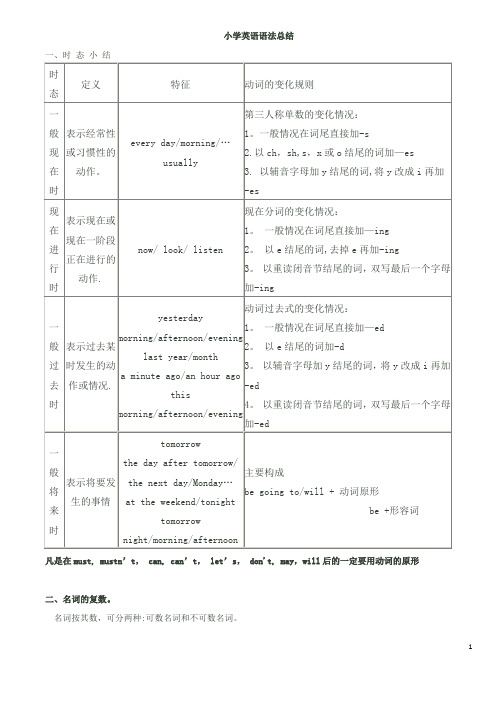
小学英语语法总结一、时态小结凡是在must, mustn’t,can, can’t,let’s, don't, may,will后的一定要用动词的原形二、名词的复数。
名词按其数,可分两种:可数名词和不可数名词。
可数名词的复数变化规则:1。
一般情况下,直接在词尾加-s,如:girl—girls, book-books, pen-pens2。
以s,x,sh,ch结尾的词,在词后加-es, 如:class—classes, box—boxes, match—matches,3. 以辅音字母+y结尾的,变y 为i 再加-es,如:city—cities, family—families, country— countries 4。
以f或fe结尾的,变f或fe为v再加-es,如:knife—knives, wife—wives, life—lives,5。
以o 结尾的加—es或—s, 如: radio-radios, tomato—tomatoes, potato—potatoes, zoo—zoos,photo-photos,6。
man—men, woman-women, foot—feet, child-children,三、形容词的比较级、最高级。
形容词有比较级与最高级之分,单音节词的变化规则:1。
一般情况下,直接在词尾加-er或—est, 如:small-smaller—smallest, short—shorter—shortest2. 以e结尾的,加-er或-est,如:large—larger—largest, nice—nicer—nicest。
3.以辅音字母+y结尾的,变y 为i 再加—er或-est, 如:busy—busier—busiest, heavy—heavier-heaviest。
4。
以重读闭音节,一个辅音字母结尾的,双写该字母,再加—er或—est,如:big—bigger—biggest,thin-thinner-thinnest。
六年级复习_PEP小学英语重点句型语法总结
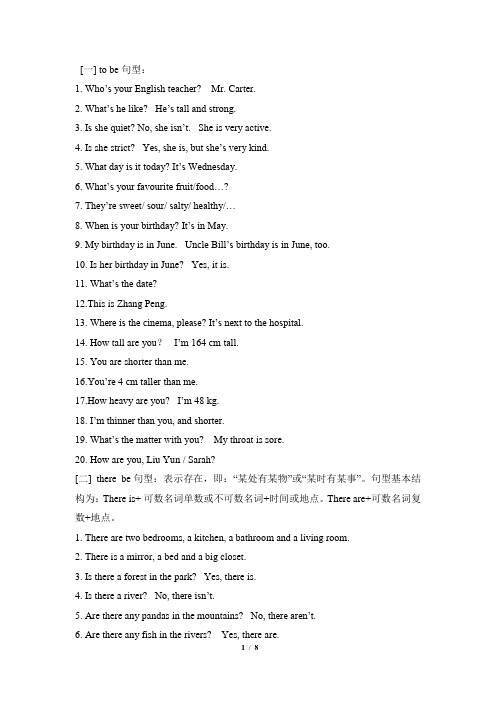
[一] to be句型:1. Who’s your English teacher?Mr. Carter.2. What’s he like?He’s tall and strong.3. Is she quiet? No, she isn’t.She is very active.4. Is she strict? Yes, she is, but she’s very kind.5. What day is it today? It’s Wednesday.6. Wha t’s your favourite fruit/food…?7. They’re sweet/ sour/ salty/ healthy/…8. When is your birthday? It’s in May.9. My birthday is in June. Uncle Bill’s birthday is in June, too.10. Is her birthday in June? Yes, it is.11. What’s the date?12.This is Zhang Peng.13. Where is the cinema, please? It’s next to the hospital.14. How tall are you?I’m 164 cm tall.15. You are shorter than me.16.You’re 4 cm taller than me.17.How heavy are you? I’m 48 kg.18. I’m thinner than you, and shorter.19. What’s the matter with you?My throat is sore.20. How are you, Liu Yun / Sarah?[二] there be句型:表示存在,即:“某处有某物”或“某时有某事”。
小学英语主要句型
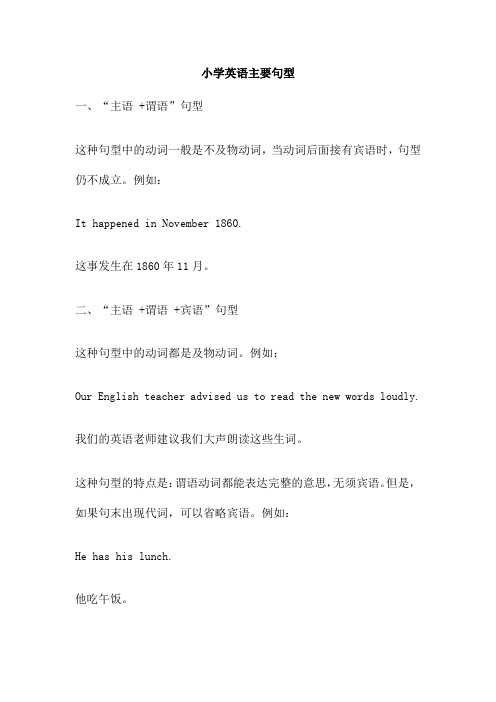
小学英语主要句型一、“主语 +谓语”句型这种句型中的动词一般是不及物动词,当动词后面接有宾语时,句型仍不成立。
例如:It happened in November 1860.这事发生在1860年11月。
二、“主语 +谓语 +宾语”句型这种句型中的动词都是及物动词。
例如:Our English teacher advised us to read the new words loudly. 我们的英语老师建议我们大声朗读这些生词。
这种句型的特点是:谓语动词都能表达完整的意思,无须宾语。
但是,如果句末出现代词,可以省略宾语。
例如:He has his lunch.他吃午饭。
三、“主语 +谓语 +间接宾语 +直接宾语”句型这种句型中的动词表示“给予”、“传递”等。
例如:Please pass me the book.(传递)请把那本书递给我。
Teacher gave me a composition to write.(给予)老师给我一篇作文写。
四、“主语 +谓语 +宾语 +状语”句型这种句型中的动词表示“使役”、“致使”等意思。
例如:What time will you have the meeting?(使役)你们什么时候开会?The news made her happy. (致使)这个消息使她高兴。
五、“主语 +系动词 +表语”句型这种句型的特点是:谓语动词都能表达完整的意思,通常与表语连用,例如:It is a map.(这是一张地图。
)The color is blue.(颜色是蓝色。
)系动词是用来表示状态的动词,如“be(是)”、“look (看起来)”、“smell(闻起来)”、“sound(听起来)”、“feel(感觉)”等。
小学英语主要句型汇总一、“主语 +谓语”句型这种句型中的动词一般是不及物动词,所谓不及物动词,就是这种动词后不可以直接接宾语。
例:It snows.下雪了。
二、There be句型There be句型表示“某地(或某时)存在有某人(或某物),而并非某地(某人、某物或某时)拥有什么东西”,句中有若干个名词作主语,动词be常与后面主语中的第一个名词在数上一致。
小学英语语法总结全集

小学英语语法总结全集小学英语语法总结全集一、基本句型1. 主语 + 系动词 + 表语2. 主语 + 动词3. 主语 + 动词 + 宾语4. 主语 + 动词 + 间接宾语 + 直接宾语5. 主语 + 动词 + 宾语 + 宾补6. There be 句型二、动词时态1. 现在时2. 过去时3. 将来时4. 现在进行时5. 过去进行时6. 现在完成时7. 过去完成时8. 将来完成时9. 现在完成进行时10. 过去完成进行时三、名词1. 可数名词2. 不可数名词3. 单数形式4. 复数形式5. 特殊名词的复数形式四、形容词1. 基本形2. 比较级3. 最高级五、副词1. 形容词转换为副词2. 表示方式、时间、频率的副词3. 比较级和最高级的副词形式六、代词1. 主格代词2. 宾格代词3. 物主代词4. 反身代词5. 指示代词6. 疑问代词7. 不定代词七、介词1. 表示位置的介词2. 表示时间的介词3. 表示原因和目的的介词八、连词1. 并列连词2. 选择连词3. 因果连词4. 时间连词5. 让步连词6. 目的连词九、冠词1. 不定冠词2. 定冠词3. 特指用的冠词十、形容词和副词的用法区别十一、固定搭配1. 动词搭配2. 形容词搭配3. 名词搭配以上是小学英语语法的基本知识点总结,针对小学阶段学习英语的学生,这些知识点是非常重要的。
在日常学习和练习中,应该多加复习和巩固,通过大量的练习和实际应用,掌握这些知识点的正确用法,提高语法水平,从而更好地运用英语进行交流和表达。
参考词汇:1. subject [ˈsʌbdʒɪkt] 主语2. verb [vɜrb] 动词3. object [ˈɑbdʒɪkt] 宾语4. complement [ˈkɑmpləmənt] 补语5. countable noun [ˈkaʊntəbəl naʊn] 可数名词6. uncountable noun [ʌnˈkaʊntəbəl naʊn] 不可数名词7. singular form [ˈsɪŋgjələr fɔrm] 单数形式8. plural form [ˈplʊrəl fɔrm] 复数形式9. adjective [ˈædʒəktɪv] 形容词10. adver b [ˈædvɜrb] 副词11. pronoun [ˈproʊnaʊn] 代词12. preposition [ˌprepəˈzɪʃən] 介词13. conjunction [kənˈdʒʌŋkʃən] 连词14. article [ˈɑrtɪkl] 冠词15. phrase [freɪz] 搭配。
小学四年级英语重点句型及语法规则

小学四年级英语重点句型及语法规则一、简单句的构成英语的简单句由主语和谓语组成,主语通常是句子的主题,而谓语则描述主语的动作或状态。
例如:•主语 + 谓语:Tom eats an apple.•主语 + 系动词 + 表语:She is tall.二、五大时态在英语中,动词的时态是用来表示动作发生的时间。
小学四年级中,学生们需要掌握五个基本时态:一般现在时、一般过去时、一般将来时、现在进行时和过去进行时。
1. 一般现在时一般现在时用于描述经常发生的动作、情况或普遍真理。
肯定句结构:主语 + 动词原形 + 其他例如:•I play basketball after school.•She likes to sing songs.否定句结构:主语 + do/does + not + 动词原形 + 其他例如:•I do not play basketball after school.•She does not like to sing songs.疑问句结构:Do/Does + 主语 + 动词原形 + 其他?例如:•Do you play basketball after school? •Does she like to sing songs?2. 一般过去时一般过去时用于描述过去发生的动作或情况。
肯定句结构:主语 + 动词过去式 + 其他例如:•I played basketball yesterday.•She danced at the party last night.否定句结构:主语 + did not + 动词原形 + 其他例如:•I did not play basketball yesterday.•She did not dance at the party last night.疑问句结构:Did + 主语 + 动词原形 + 其他?例如:•Did you play basketball yesterday?•Did she dance at the party last night?3. 一般将来时一般将来时用于描述将来发生的动作或情况。
- 1、下载文档前请自行甄别文档内容的完整性,平台不提供额外的编辑、内容补充、找答案等附加服务。
- 2、"仅部分预览"的文档,不可在线预览部分如存在完整性等问题,可反馈申请退款(可完整预览的文档不适用该条件!)。
- 3、如文档侵犯您的权益,请联系客服反馈,我们会尽快为您处理(人工客服工作时间:9:00-18:30)。
She is Who she is my who. she? is. sister.
再 来 一 道 简 单 的!
一找:对人进行提问用who 二代:用who代替划线部分 三移:把who放在句首 四变:把she is 变为一般疑问句
This is What ’s this is a what. this? this? dictionary. is.
二、改为一般疑问句
1、先找be动词 am, is, are, was, were或情 态动词can, may ,must, would, should ,could .如果有这些词,直接把这些词 放在句子最前面, some 改成any,句号改成 问号!其余照抄;(注意人称的变化)
例: He should do his homework.(改为一般疑问句) Should he do his homework? _____________________________________ I am listening to music.(改为一般疑问句) _____________________________________ Are you listening to music?
主格:
宾格: 形容词性物 主代词:
I
me
we
us
you
you
she
her
he
him
it
it
they
them
my
our
your
her
his his
its its
their theirs
名词性物主 mine ours yours hers 代词:
(注:我I 、我们we 是第一人称;你you,你们you是第 二人称;剩下的全部是第三人称)
一找:对颜色进行提问用what color 二代:用what color代替划线部分 三移:把what color放在句首 四变:把the
jacket is 变为一般疑问句
The books the are are books the are where. books? under are. the bed. Where ’re the books?
问目的 问情况 问年龄
which
why what what time what colour
哪一个
为什么 什么 什么时间 什么颜色
问选择
问原因 问东西、事情 问时间 问颜色
how many
how much how about how far
多少
多少 …怎么样 多远
问数量
问价钱 问意见 问路程
例:
1、They are looking for bag.(对画线部分提问) What are they looking for? 2、I am riding my bike now.(对画线部分提问) What are you doing? 3、There are twelve studens in the classroom. (对画线部分提问)
We play basketball on Sundays.(改为一般疑问句)
Do you play basketball on Sundays?
.
三、对划线部分提问 对划线部分进行提问,即针对句子中的某一成 分提出问题,可利用“四步法”进行提问。
一找:找特殊疑问词;
(what when how where who which whose等)
小学英语语法总复习 (句型)
三种基本句式
一、肯定句
主语+be动词+名词/形容词。
(1)判断句:什么是什么,什么怎么样。
I am a girl. 我是一个女生。
He is smart. 他很聪明。
It’s tasty! 它可好吃了!
(2)陈述句:谁干什么,谁有什么。
主语( +情态动词)+实义动词+其他。
再 来 一 道 更 难 的!
一找:对地点进行提问用where 二代:用where代替划线部分 三移:把where放在句首 四变:把the
books are变为一般疑问句
再 来 一 道 更 难 的!
How oldis is the boy? The the how boy old. is. old. Theboy boy is 10 years 一找:对年龄进行提问用How old 二代:用how old代替划线部分 三移:把how old放在句首 四变:把the boy is变为一般疑问句
句式转换
否定句
肯定句
疑问句
一般疑问句
特殊疑问句
句型变换主要有以下题型:
一、改为否定句。 二、改为一般疑问句。 三、对划线部分提问。
一、改为否定句
1、先找be动词 am, is, are, was, were或情态动词can, may ,must, would, should ,could .如果有这些词,直接在 这些词的后面加not(可与前面相邻单词 缩写为n’t), some 改成any,其余照 抄;
例: Lingling watched TV last night.(改为一般疑问句) Did Lingling watch TV last night? .
Tom likes listening to music .(改为一般疑问句)
Does Tom like listening to music ? .
Can you speak English?你会说英语吗?
Do you like music?你喜欢音乐吗? Does she have a ruler?她有尺子吗?
②特殊疑问句:含有疑问词的问句。
疑问词:What When Why Who Where How 5W.H
What:什么
What do you have on Monday?
二代:用特殊疑问词代替划线部分;
三移:把特殊疑问词移到句首;
四变:未划线部分变为一般疑问句。
What my telephone number is. 741-865. My telephone number is what.
做 道 题 试 试 吧!
一找 :对数字进行提问用 what What is your telephone number? 二代:用what代替划线部分 三移:把what放在句首 四变:把My telephone number is 变为一般疑问句
疑问词及其用法:
单词 when who whose where 意思 什么时间 谁 谁的 在哪里 用法 问时间 问人 问主人 问地点 what about what day …怎么样 星期几 问意见 问星期
what date
what for how how old什么日期为何目的Fra bibliotek…怎么样 多大
问具体日期
部分照抄。 其他情况均要在句子动词前面加
don’t,some改成any,其它部分照抄.
例: Lingling had a hamburger for breakfast.(改为否定句)
Lingling didn’t have a hamburger for breakfast. .
She has got some pens.(改为否定句) She doesn’t have got any pens. .
例: 1、Helen is a beautiful girl.(改为否定句) Helen is not a beautiful girl. 2、I can speak French. (改为否定句) I can‘t speak French. 3、There were some buses.(改为否定句)
再 来 一 道 简 单 的!
一找:对物体进行提问用what 二代:用what代替划线部分 三移:把what放在句首 四变:把this is 变为一般疑问句
The jacket What coloris the is what red. the jacket jacket? color. is.
再 来 一 道 难 点 的!
注意:
对谓语动词的提问,其中实意动词要用do 的相对应形式代替, 省略掉宾语。 He watches TV in the evening What does he do in the evening? He watched TV yesterday evening. What did he do in the evening? He is watching TV now. What is he doing now? He is going to watch TV this evening. What is he going to do?
How many students are there in the classroom?
4.The new coat is three yuan. (对划线部分提问) ___________________________________________ How much is the new coat? 5.You can go there by bus. (对划线部分提问) ___________________________________________ How can I go there? 6.I got up at six this morning .(对划线部分提问) ___________________________________________ When did you get up? 7. Tom is reading books in the room. (对划线部分进 行提问) ___________________________________________ What is Tom doing?
